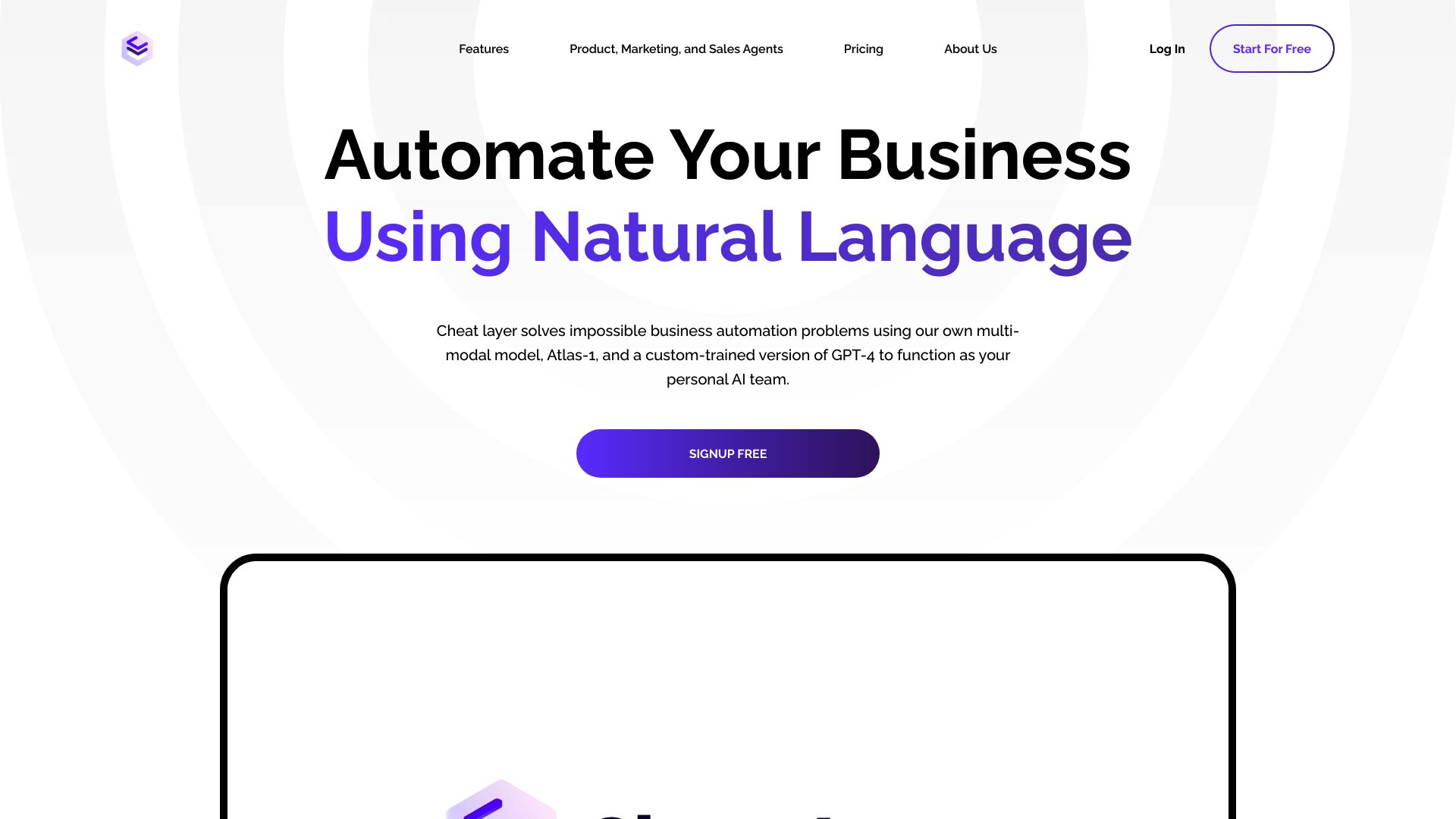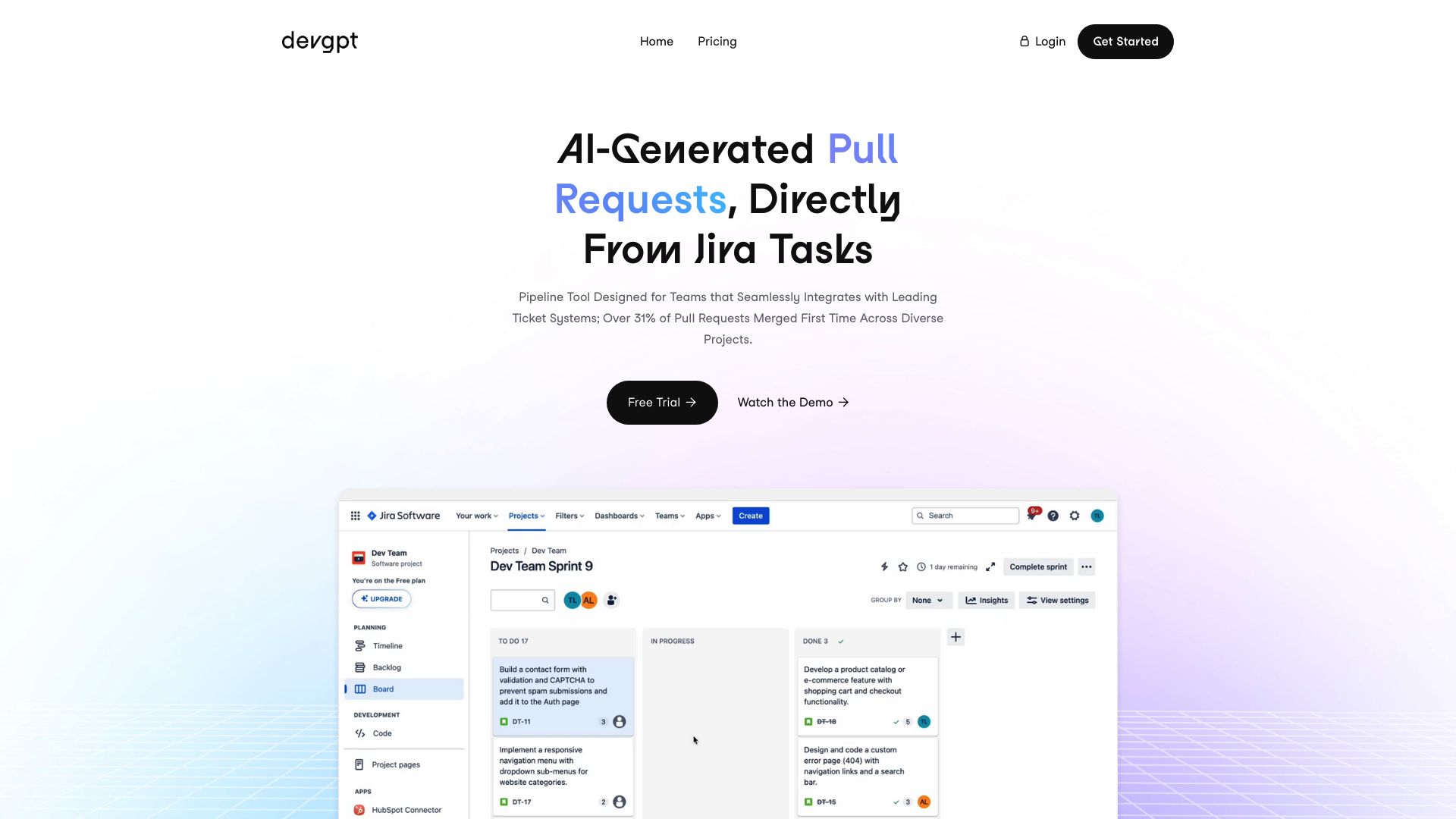Cheat Layer vs. DevGPT: AI Automation Showdown
AI-driven automation platforms revolutionize software development and business operations. Cheat Layer vs. DevGPT offer unique approaches to streamline workflows, but SmythOS emerges as the superior solution. This comparison explores how each platform empowers users, from non-technical professionals to experienced developers, to harness AI’s potential.
We’ll examine key features, use cases, and overall utility to help you choose the right tool for your needs. Whether you’re automating complex business processes or generating code, understanding these platforms’ strengths and limitations is crucial for making an informed decision in today’s AI-driven landscape.
Cheat Layer Overview
Cheat Layer revolutionizes business automation with its AI-driven platform. Leveraging a custom-trained GPT-4 and the multi-modal Atlas-1 model, Cheat Layer empowers users to solve complex automation challenges using natural language commands.


The platform’s Project Atlas Framework stands out, enabling users to generate automations of unlimited complexity through simple conversations. This approach mimics the experience of speaking with an engineer, making advanced automation accessible to non-technical users. Cheat Layer’s Semantic Targets feature ensures automations remain functional even as services update, using natural language to define targets and enhance longevity.
Cheat Layer empowers users to solve complex automation challenges using natural language commands.
For marketing and sales professionals, Cheat Layer offers 1-Click Cloud Agents. These pre-built solutions automate content generation, A/B testing, and lead generation processes with minimal setup, deployable directly from mobile devices. The platform’s Live Mode facilitates iterative development of products like apps and landing pages, providing real-time feedback to ensure outputs align with intended goals.
Cheat Layer caters to a diverse user base with its no-code interface, featuring a drag-and-drop editor that simplifies automation creation. This democratization of AI technology enables small businesses to compete with larger firms by leveraging powerful, cost-effective automation tools. The platform’s vision centers on removing barriers to business creation and operation, fostering an environment where quality service and personal relationships drive success.
Cheat Layer caters to a diverse user base with its no-code interface, featuring a drag-and-drop editor that simplifies automation creation.
While Cheat Layer offers impressive capabilities, users should consider potential limitations in scalability for enterprise-level deployments and the learning curve associated with its advanced features. The platform’s effectiveness in handling very large datasets or extremely complex workflows may vary, requiring careful evaluation for high-volume enterprise use cases.
DevGPT Overview
DevGPT empowers software developers to streamline their coding workflows through AI-assisted automation. The open-source platform transforms natural language descriptions into executable code, saving developers significant time on repetitive tasks.


DevGPT’s key features include personalized AI training on a developer’s codebase, editable AI-generated outputs, and integration with popular development tools like GitHub and Jira. The platform leverages advanced language models such as GPT-4 and Codex to power its code generation capabilities.
DevGPT shines in automating common development workflows, allowing programmers to focus on more complex challenges.
Users report significant productivity gains, with some saving over 10 hours per week on coding tasks. DevGPT shines in automating common development workflows, allowing programmers to focus on more complex challenges. The tool’s ability to understand context and generate code tailored to a team’s specific style sets it apart from generic coding assistants.
While DevGPT offers powerful features for individual developers and small teams, it may have limitations for enterprise-scale deployments. The platform’s current focus appears to be on serving smaller development groups rather than large corporations. As with any AI tool, developers should carefully review generated code to ensure quality and security standards are met.
Feature Comparison
Cheat Layer and DevGPT offer distinct approaches to AI-assisted development, with some key differences in their core components and security features. Cheat Layer provides a comprehensive platform for business automation, leveraging custom-trained GPT-4 and Atlas-1 models to generate complex automations through natural language interactions. Its Project Atlas Framework enables users to create end-to-end solutions conversationally, mimicking discussions with an engineer. In contrast, DevGPT focuses specifically on code generation for software developers, transforming natural language descriptions into executable code snippets.
While both platforms emphasize ease of use, Cheat Layer’s no-code interface and drag-and-drop editor make it accessible to a broader audience, including non-technical users. DevGPT, on the other hand, caters primarily to developers and may require more technical expertise. In terms of security, Cheat Layer offers robust features like data encryption and OAuth support, which are crucial for enterprise-level deployments. DevGPT’s open-source nature may provide more flexibility for customization but could potentially lack some of the built-in security measures found in Cheat Layer.
Our SmythOS platform stands out by offering a more comprehensive suite of features that combines the strengths of both Cheat Layer and DevGPT while addressing their limitations. We provide a user-friendly visual builder alongside powerful AI capabilities, extensive API integrations, and enterprise-grade security measures. Our platform’s scalability and versatility make it suitable for both individual developers and large organizations, offering a superior solution for creating and deploying AI agents across various use cases.
Feature Comparison Table
| Cheat Layer | DevGPT | SmythOS | |
|---|---|---|---|
| CORE FEATURES | |||
| Hosted Agents (Dev, Production) | ✅ | ❌ | ✅ |
| Environments (Dev, Production) | ✅ | ❌ | ✅ |
| Visual Builder | ✅ | ❌ | ✅ |
| No-Code Options | ✅ | ❌ | ✅ |
| Autonomous Agents | ✅ | ❌ | ✅ |
| Explainability & Transparency | ✅ | ❌ | ✅ |
| Multimodal | ✅ | ❌ | ✅ |
| Multi-Agent Collaboration | ✅ | ❌ | ✅ |
| Audit Logs for Analytics | ✅ | ❌ | ✅ |
| Bulk Work | ✅ | ❌ | ✅ |
| Agent Work Scheduler | ✅ | ❌ | ✅ |
| Logs & Monitoring | ✅ | ❌ | ✅ |
| SECURITY | |||
| Constrained Alignment | ✅ | ❌ | ✅ |
| Data Encryption | ✅ | ❌ | ✅ |
| OAuth | ✅ | ❌ | ✅ |
| IP Control | ❌ | ❌ | ✅ |
| COMPONENTS | |||
| Foundation AIs | ✅ | ❌ | ✅ |
| Huggingface AIs | ❌ | ❌ | ✅ |
| Zapier APIs | ✅ | ❌ | ✅ |
| All other APIs, RPA | ✅ | ❌ | ✅ |
| Classifiers | ✅ | ❌ | ✅ |
| Logic | ✅ | ❌ | ✅ |
| Data Lakes | ❌ | ❌ | ✅ |
| DEPLOYMENT OPTIONS (EMBODIMENTS) | |||
| Deploy as API | ✅ | ❌ | ✅ |
| Deploy as Webhook | ✅ | ❌ | ✅ |
| Staging Domains | ✅ | ❌ | ✅ |
| Production Domains | ✅ | ❌ | ✅ |
| API Authentication (OAuth + Key) | ✅ | ❌ | ✅ |
| Deploy as Site Chat | ✅ | ❌ | ✅ |
| Deploy as Scheduled Agent | ✅ | ❌ | ✅ |
| Deploy as GPT | ✅ | ❌ | ✅ |
| Scalability | ✅ | ❌ | ✅ |
| DATA LAKE SUPPORT | |||
| Hosted Vector Database | ❌ | ❌ | ✅ |
| Sitemap Crawler | ✅ | ❌ | ✅ |
| YouTube Transcript Crawler | ✅ | ❌ | ✅ |
| URL Crawler | ✅ | ❌ | ✅ |
| PDF Support | ✅ | ❌ | ✅ |
| Word File Support | ✅ | ❌ | ✅ |
Best Alternative to Cheat Layer and DevGPT
SmythOS emerges as the premier alternative to Cheat Layer and DevGPT, offering a comprehensive AI automation platform that combines the strengths of both while addressing their limitations. Our drag-and-drop interface simplifies the creation of complex AI workflows, making advanced AI functionalities accessible to users with varying levels of technical expertise. Unlike DevGPT’s focus on code generation, we enable the development of versatile AI agents for a wide range of applications beyond software development.
SmythOS emerges as the premier alternative to Cheat Layer and DevGPT, offering a comprehensive AI automation platform that combines the strengths of both while addressing their limitations.
Our platform’s extensive integration ecosystem surpasses Cheat Layer’s capabilities, supporting a vast array of AI models, APIs, and tools. This flexibility allows SmythOS to seamlessly fit into virtually any workflow or business process. We provide pre-configured connectors and templates for common tasks, significantly reducing setup time and allowing users to focus on innovation rather than implementation details.
SmythOS stands out with its multi-agent orchestration feature, enabling teams of AI agents to collaborate on complex tasks. This enhances the efficiency and scalability of AI implementations, surpassing the capabilities of both Cheat Layer and DevGPT. Our versatile deployment options allow agents to be integrated across various platforms, including major cloud services and popular AI interfaces, ensuring seamless integration into existing systems.
SmythOS stands out with its multi-agent orchestration feature, enabling teams of AI agents to collaborate on complex tasks.
Security and scalability set SmythOS apart from competitors. We offer robust features like data encryption, OAuth support, and IP control, crucial for enterprise-level deployments. Our platform’s scalability supports growing businesses, from individual developers to large organizations, providing a solution that evolves with your needs. With SmythOS, users gain access to a comprehensive suite of AI tools, combining ease of use with powerful capabilities, making it the superior choice for those seeking to harness the full potential of AI across unlimited use cases.
Conclusion
Cheat Layer and DevGPT offer unique approaches to AI-assisted development and automation. Cheat Layer’s business automation platform empowers users with natural language interactions and pre-built solutions, while DevGPT focuses on streamlining coding workflows for software developers. Both tools demonstrate the potential of AI to enhance productivity and accessibility in their respective domains.
However, SmythOS emerges as the superior choice, combining the strengths of both platforms while addressing their limitations. Our comprehensive suite of features includes a user-friendly visual builder, extensive API integrations, and robust security measures. We offer unparalleled flexibility in deployment options, allowing users to create AI agents once and deploy them across various platforms and services.
SmythOS stands out with its scalability and versatility, making it suitable for individual developers, small teams, and large enterprises alike. Our platform’s ability to handle complex workflows, support multi-agent collaboration, and integrate with a vast ecosystem of over 300,000 tools and services positions us at the forefront of AI-powered automation.
To experience the future of AI workforce automation, create a free SmythOS account today. With our risk-free trial offering unlimited agents and a 30-day money-back guarantee, you can explore the full potential of AI-driven productivity without commitment. Discover our diverse range of AI-powered agent templates to jumpstart your journey towards revolutionizing your workflow and unleashing unprecedented levels of efficiency and innovation.
Last updated:
Disclaimer: The information presented in this article is for general informational purposes only and is provided as is. While we strive to keep the content up-to-date and accurate, we make no representations or warranties of any kind, express or implied, about the completeness, accuracy, reliability, suitability, or availability of the information contained in this article.
Any reliance you place on such information is strictly at your own risk. We reserve the right to make additions, deletions, or modifications to the contents of this article at any time without prior notice.
In no event will we be liable for any loss or damage including without limitation, indirect or consequential loss or damage, or any loss or damage whatsoever arising from loss of data, profits, or any other loss not specified herein arising out of, or in connection with, the use of this article.
Despite our best efforts, this article may contain oversights, errors, or omissions. If you notice any inaccuracies or have concerns about the content, please report them through our content feedback form. Your input helps us maintain the quality and reliability of our information.
